- Home
- Barbara Metzger
My Lady Innkeeper
My Lady Innkeeper Read online
MY LADY INNKEEPER
Barbara Metzger
Chapter One
“Toads! All men are toads,” declared Miss Lyndell Markham as she paced around her aunt’s sitting room, waving a scrap of parchment. “They seek a woman for her money, her family name, her looks or her virtue—not an honest motive in their hearts. A woman can’t trust any of them!” Miss Markham paused in her agitation to seek confirmation from her audience of one, her cousin Isabelle, whose advanced state of pregnancy proclaimed her trafficking with the enemy. Bella murmured “No, dear,” without missing a stitch of her embroidery. Miss Markham’s complaints were not new ones. Nor were they without foundation.
Unfortunately for man’s baser motives, Miss Markham was blessed, or cursed, with a multitude of temptations. As for wealth, she was one of the foremost heiresses of the realm; for lineage, the sole child of the late Viscount Markham, whose title was ancient and impeccable. As to beauty, with her vibrant red-gold hair now cropped into fashionable curls, startlingly clear green eyes, a peach-blush complexion and a graceful figure of ideal proportions, the whole carried with an elegance of manner and garbed in exquisite taste, Lyndell just missed perfection by a nose. The Markham Nose, to be exact; patrician to be polite; less than straight to be truthful. As her father had predicted, “As long as my money is inherited with my nose, they’ll still call her a Beauty.” If not an Incomparable, she was often called the Magnificent Miss Markham.
As for virtue, in certain baser circles, such as White’s betting book, she was dubbed the Unmountable Markham. Lyndell had managed to attain her twenty-fourth year with virtue intact despite importunities by every expert with rakish ways and roving hands. These importunities provided one, but only one, of the day’s grievances. In a swirl of amber crepe and green riband, Lyndell flicked the letter at her inattentive cousin.
“It’s not enough I have to suffer every puppy’s drooling and every basket-scrambler’s begging to pay his addresses—to my estate!—but now every loose screw feels I’ve been on the Town so long I’m past the age of innocence.”
With a faint smile, Isabelle denied the possibility. “Come, Lyndy, no gentleman would treat you like a ... a ...”
“A light-skirt? Bella, you are such a babe! Yes, I know you’re an old married woman of twenty-six. But you’re a prelate’s wife.” Before Isabelle could make any disclaimers, Lyndell recommenced her pacing, her steps the strides of a tall, confident woman. “Here, do you know Lord Naybors?”
“Yes, I met his wife at—”
“Last night at the Bellinghams’ ball he asked me to stand up with him and I accepted, thinking to have some rational conversation at last. He kept dancing toward the balconies and then almost pushed me out, for some fresh air, he said.”
“But Lyndy, it was freezing! It’s November!”
“Exactly! And his wife is at home with a sick child! I put a flea in his ear, you can be sure, but it’s always the same. Society says a woman’s reputation is all-important, and every man is out to help her lose it. Then she’ll be labelled ‘fast,’ Society will turn its back, and no one will marry her! Well, I am tired of those games.”
“Is there no man who can inspire a tendre in you?”
“What, Bella, you too?”
Isabelle flushed and lowered her eyes to her needlework again, fashioning rosebuds to an impossibly tiny bonnet.
“Are you joining the throng to see me wed? Aunt and Uncle are despairing, and even Lady Jersey hinted I was too long in the tooth to be so particular.”
“No, Lyndy, you know I only want to see you happy!” Bella didn’t say, “As I am,” and Lyndell didn’t say, “Married to an old stick as you are?” but she gave an unladylike snort. “Not likely, among the lobcocks and loobies one sees at all the ton parties. I’ve met all the eligibles, and I’d rather stay on the shelf!”
“Perhaps Father could speak to an older gentleman, one with wealth of his own ... ?”
“You mean a marriage of convenience? I think not! I’ve found them to be damnably inconvenient, especially for the woman! She gives up her freedom, hands her finances into his keeping, in exchange for what? The right to bear his children! The husband now has her properties to gamble away without touching his own holdings, and the right, no, the responsibility, to enjoy his mistresses in Town, while his wife sits in the country breeding. No, thank you!”
“But, Lyndy, don’t you wish to be married at all?”
There was a moment of silence as Lyndell seemed to lose some of her bravado. She sank to the floor near her cousin’s chair, fingering the tiny cap.
“Yes, Bella.” She spoke in a subdued tone, and with a tinge of wistful sadness. “I would dearly like to be married, to love and be loved, to share. But I cannot give my hand without giving my heart, and I’ve not found the man I could love and trust and ... and cherish, the way my parents did each other. Do you understand, cousin, that I could never do what Mama did, after Papa died? I may stay on the shelf forever, but I’ll never marry just so I’ll not be alone.”
Lady Markham’s second marriage, a scant year after the viscount’s passing, was a mistake, and a further tragedy for the grieving twelve-year-old Lyndell. She simply couldn’t understand how her sweet, gentle mother could transfer her affections from Viscount Markham, a noble in every respect, to the very common Joshua Riddley. It was not that the young Miss Markham was a snob, but Riddley was far beneath her father in education, civility, gentility, everything that makes for a cultured gentleman. In fact, Riddley was no gentleman. A member of the most minor landed gentry, his main interests were gaming, drinking and riding to the hounds. When he couldn’t chase the fox, he chased serving girls. This was the man Lyndell’s mother chose to succeed the viscount. Despite capable managers and her own brother’s assistance, Lady Markham simply could not face the responsibilities of the vast King’s Mark estate and a willful daughter, combined with the bleak future of years of loneliness ahead, or having to face the London Marriage Mart as a no-longer-young widow. And there was Joshua Riddley, a widower with a young son. He was jovial, undemanding, known for years; he was ready to shoulder all her burdens.
If Lady Markham’s burdens were the sweetest windfall Riddley had ever known, he managed to hide his true colours. At least for a few months after the wedding, that is, until he saw exactly what was his directly, through his wife’s settlements, and what he could carefully glean as overseer of the viscount’s unentailed properties—Lyndell’s inheritance. Suddenly he could indulge his habits to excesses he had only dreamt of, embarrassing his new wife, infuriating and mortifying his new daughter. He abused the servants, misused or neglected the tenants and the lands Lyndell had been taught to honour. He used Markham money to set his own son Jasper up as a wastrel, a fribble with no need to earn a living or learn a trade, just another gaming, drinking leech.
Neither father nor son had the mental scope to beggar the estate nor, with the capital investments untouchable in London, to greatly affect Lyndell’s wealth, yet the lands, and her pride, suffered. For four years she could do nothing. Then her mother died. Faded, tired, isolated by embarrassment from all social life, Mrs. Riddley drifted from weakness to illness to death. It was, or seemed to the then sixteen-year-old Lyndell, another solution of least effort, another betrayal. Before leaving King’s Mark to take up residence with her Aunt Lillian and Uncle Hardesty in London, Lyndell threw the Riddleys off her lands. The father she threatened with court action if he ever approached her again. To her step-brother Jasper, an ineffectual ne’er-do-well, she offered a one-time sum of money to purchase an army commission, or passage to America, or a university education so he might find a profession, whatever, just to be gone. Now, eight years later, after the Bath Seminary for
Young Ladies, after her presentation and warm welcome to the ton, Lyndell still carried the scars of distrust and disdain.
Today she also carried a letter from Jasper Riddley.
Shaking off the despondency of sad memories and loss, Lyndell jumped to her feet and tossed her head, as if to rearrange her thoughts along with her curls. Laughing, she proclaimed, “Men are all fools. They must inherit it from their fathers!”
Isabelle was relieved at the lightening of her cousin’s mood and hastened to change the topic. “I collect you mean Jasper—you said he’d written—but I can’t understand what has you in such a taking. He is not asking for more money, is he? I thought that was settled years ago.”
“Oh yes, well settled! I paid his debts and thought to provide for his future in some respectable way. Instead he and Joshua went to London and proceeded to gamble the sum away. If Joshua hadn’t been killed in a duel over some marked cards, they would both have landed in debtor’s prison, and I’d have let them rot there.”
“You know you wouldn’t have been so hard, Lyndy, especially not on poor Jasper.”
“ ‘Poor Jasper,’ is it? You always had a soft spot for him, even as a child, after he rescued your kitten from the goldfish pond. I always thought he’d tossed it in himself just to tease you, but no mind. I don’t know if I actually could have let Jasper die in prison, but I would certainly have let him sit there a while. It might have averted his next actions.”
“You mean the inn?”
“Yes. To take what remained of his money—my money!—and return to Suffolk, not ten minutes away from King’s Mark, and purchase a tavern! Not even a respectable coaching house on the Norwich road where he might have made a profit, but a dreary little wayside inn, little more than a hedgerow pub. And he had the nerve, the sheer gall, to call it King’s Pass!”
Isabelle smiled. “Perhaps he was acknowledging his debt to you.”
Lyndell merely gave her cousin a dark look. “It never mattered overmuch, since no one in London knew of the relation, and everyone near home knew I had cut the connexion, but my ... my ... step-brother”—the words almost choked her—”a common innkeep! And none too successful either. His principal income came from fleecing at cards any well-heeled traveller unfortunate enough to be stranded at the place. If he could. More often Jasper would lose. The noddy couldn’t even cheat right! But that’s nothing, nothing, I tell you, to this! Here.” She handed the letter over to her cousin. “See for yourself.”
“ ‘Dear Sister,’ “ Isabelle read, ignoring the unladylike growl coming from Lyndell’s throat. “ ‘Here is the deed to King’s Pass Inn, made over to your name. No fear, they’ll never connect you with the spies.’ Oh dear.”
“It gets better. Keep reading.”
“ ‘I swear to you I thought the Quinns, the previous owners, you know—they stayed on to run the inn for me— were merely involved with the Gentlemen. That’s smugglers, if you don’t know the term. But it turns out they were also waylaying couriers bound for the army installations at Southwold Barracks, drugging the wine and copying orders, or getting the soldiers jug-bitten enough to tell secrets, and passing the information on to the Frenchies, with the help of some London swell. The messengers would never reveal they’d stopped off for a wet, or a wench, so no one was the wiser till a courier was found dead and his papers gone, and a Captain Drew Jamison started nosing around. The Quinns shabbed off, leaving me in a pretty pickle, I can tell you. Quinn said his London connexion—it could have been any of several nobs who stopped here occasionally—would be watching to make sure I didn’t snabble on them or they’d dim my lights too.’ “
Bella looked up enquiringly.
“That means kill him,” Lyndell informed her tersely.
After a quick horrified gasp, Bella continued to read:
“ ‘With Nappy defeated the whole should blow over eventually unless the magistrates connect me somehow to the dead messenger, or to a few robberies at the coaching inn by Framingham. Then I’d be finished either way, so I’m hiding out for a while. Dilly, I’m depending on you to save my skin. Yours too, if it comes to that. You wouldn’t want your brother up on King’s Bench warrants, I’m sure. I know you can pull it off with all your influence in Town. You’re my only hope. Your affectionate brother, Jasper.’ “ Isabelle’s voice faded away, as she sat in stunned silence.
“Spies, smugglers, highwaymen. What do you think of Jasper now? I’ll bet he knew all along what was going on. Even a skitter-wit like Riddley can recognise French brandy and despatch cases. As long as he was being paid, he’d not question the French Army’s landing force putting up at his miserable inn! And how true to character, running off, leaving me with a witches’ broth abrewing!” Spots of colour highlighted Miss Markham’s cheeks as her redheaded temper again took control.
“But Lyndy, what are you going to do?”
“Do?” she sputtered. “What should I do? Run to the Admiralty and say my step-brother knows a spy in London but he’s too cowardly to identify him, so please forgive him? Or tell the magistrate Jasper would never exert himself so far as to murder anyone, but he’s simply gone on a repairing lease, so you must not suspect him? What kind of fool would I look?”
“Good heavens,” Isabelle said as it all sank in, “he’ll be deported, giving aid and shelter to criminals.”
“Oh, no, he won’t.” Lyndell countered. “They hang traitors.”
Chapter Two
Inactivity and indecision made up no part of Lyndell Markham’s five-foot-six-inch frame. Having taken control of her own life at the age of sixteen, and capably too, she was not about to yield her fate to mere chance now. Especially with the London Season growing so tedious, and what looked to be high adventure beckoning. Murder, mayhem, treason, a high-born villain—the Minerva Press couldn’t equal Jasper’s bumblebath. Lyndell knew exactly what she had to do: leave London with as little fanfare as possible, set herself up at the inn, and trap the spy. The details could be worked out later.
The first part of the plan involved swearing Isabelle to cooperative secrecy. From years of experience with her headstrong cousin, Isabelle knew better than to try dissuading Lyndell from her hey-go-mad start, but she did inject some practicality by mentioning such items as danger and propriety. It was unthinkable for a well-born lady to be staying at an inn unchaperoned, and everyone within miles of King’s Mark would recognise the viscount’s daughter. Furthermore, what could a single woman do in the face of such ruthlessness that Jasper couldn’t? Lyndell was forced to agree that her plan had flaws, but with a little thought she could correct the major problems: first, she would pretend to be Miss Lynn Riddley, Jasper’s sister and the new innkeeperess, and she would wear a disguise, which, to Isabelle’s dismay, seemed to make the plot even more attractive. Lyndell would stay away from her home, and take no London servants who could gossip. Instead she’d ask the Bennetts to travel with her, for protection and to satisfy convention. Sarah Bennett had been Lyndell’s nurserymaid and Joseph had been her father’s groom. Pensioned off to a cottage in Islington, there was no more respectable, loyal pair. Isabelle had to be content.
Lady Hardesty was even easier for Lyndell to persuade, by the simple expedient of lying. Miss Markham appeased her conscience by reflecting that the truth would only worry Aunt Lillian, and what way was that to repay all her kindnesses? Besides, Lyndell had to start practicing subterfuge somewhere, if she was to be any good at thief-taking. So she claimed a serious problem at the manor—not far from the truth—and exhaustion from the constant London rounds, as her reasons for begging off all their engagements. If Lady Hardesty was a little quick in her acceptance of Lyndell’s departure, Lyndell could understand. It could be no pleasure for Aunt Lillian either, despite the many disclaimers, to be still chaperoning her niece after all these years, listening to the tattle-mongers link Lyndell’s name with one bachelor after another, and have the girl still, disappointingly, on her hands. After all, Lady Hardesty had married her own
daughter off before Bella was eighteen. Of course, she’d often said, it was different; Lyndell was an heiress. But no, as long as she knew the Bennetts were along. Aunt Lillian could see no objection to the Suffolk trip. The Bennetts, however, were not so easy to convince.
Lyndell straightened the bow on her chip-straw bonnet as the carriage drew up before the neat white cottage with its kitchen garden off to the side. She had to laugh at herself, a grown woman, tidying up to face people who’d known her as an infant. That they still shared a comfortable affection was obvious in the warm greetings, the cosy hominess of tea and fresh-baked strawberry tarts in the tiny kitchen. There could be no untruths here, Lyndell knew, not when she was asking them to share the danger. A little subtlety, perhaps, but no outright lies.
“Do you remember the inn Jasper Riddley purchased, just to the south of King’s Mark?” she asked, after the table had been cleared and Bennett’s clay pipe had been lit. “The one the Quinns used to have?”
At their nods she continued, “Well, Jasper’s run into a bit of difficulty and I wish to go there to see what help I can be. And it occurred to me you might enjoy a holiday in the country as well.”
“How nice for you to think of us, dear, wasn’t it, Mr. Bennett?”
Joseph raised one brow and thoughtfully tapped his pipe on the fireplace.
“Then again,” Lyndell continued, figuring in for a pence, in for a pound, “I’m fairly certain Jasper will be removing from the area permanently and I thought you might be interested in taking over the inn.” She had an awful moment of self-reflection when she saw herself enmeshed in the life of crime: cajolery, then lies, now bribery, and she’d only been at it for a few hours! What next? Go for the weak spot! She turned to Sarah. “You know you’ve been saying how the city is getting so large it’ll be at your doorstep soon, with all its noise and dirt and bother. And you, Benny, I know you’d rather keep horses of your own than work for hire at that livery, and you’d still have your pensions. I thought we could all travel together, and stay a short while to see if you like it, before making any decisions. Of course we’d have to start out soon.”

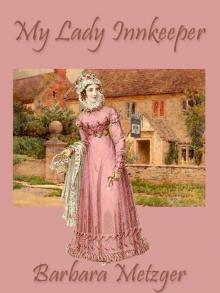 My Lady Innkeeper
My Lady Innkeeper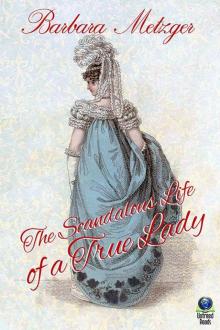 The Scandalous Life of a True Lady
The Scandalous Life of a True Lady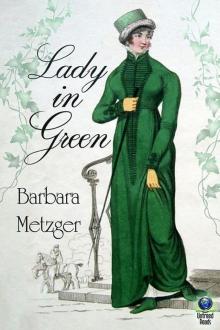 Lady in Green
Lady in Green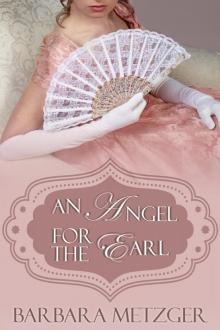 An Angel for the Earl
An Angel for the Earl Truly Yours
Truly Yours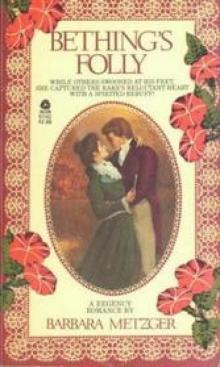 Bething's Folly
Bething's Folly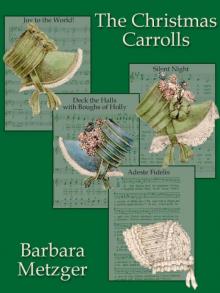 The Christmas Carrolls
The Christmas Carrolls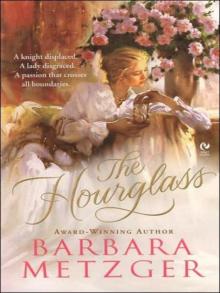 The Hourglass
The Hourglass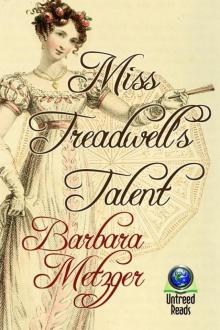 Miss Treadwell's Talent
Miss Treadwell's Talent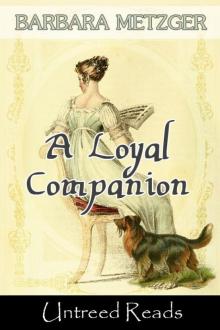 A Loyal Companion
A Loyal Companion Love, Louisa
Love, Louisa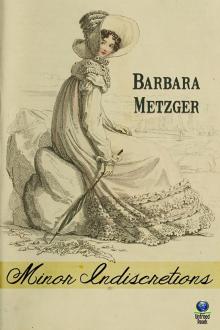 Minor Indiscretions
Minor Indiscretions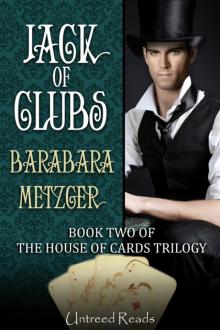 Jack of Clubs
Jack of Clubs An Enchanted Christmas
An Enchanted Christmas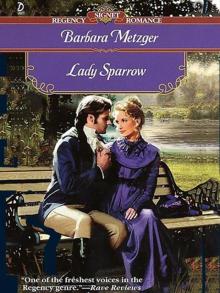 Lady Sparrow
Lady Sparrow Miss Westlake's Windfall
Miss Westlake's Windfall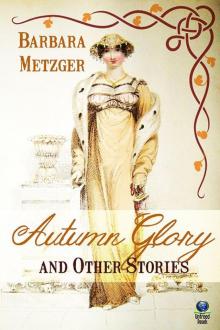 Autumn Glory and Other Stories
Autumn Glory and Other Stories Greetings of the Season and Other Stories
Greetings of the Season and Other Stories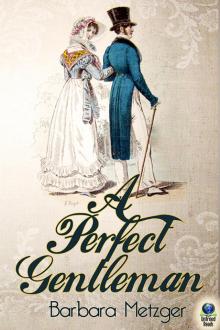 A Perfect Gentleman
A Perfect Gentleman